For 15 straight home football matches dating back to June 2015, fans of the Hong Kong national team have booed the anthem of the Chinese Communist Party. Meanwhile, the Party has just promulgated a new anthem law for the mainland and inserted it into Annex III of Hong Kong’s Basic Law, requiring the Hong Kong government to pass local legislation which will ban “disrespect” of the anthem.
#NotMyAnthem explainer
First, let’s get a few things straight. I don’t consider what the Communist Party calls the “national anthem” the national anthem. It is the Party anthem. I don’t consider what the Party calls the “national flag” the national flag. It is the Party flag. I don’t consider what the Party calls the People’s Republic of China a people’s republic. It is the Party’s republic.
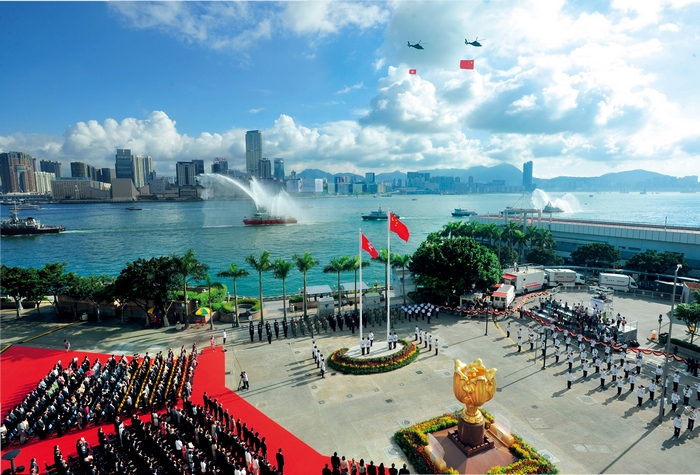
All of these, anthem, flag and republic, were decided by the Party without the people’s participation. All are symbolic of dictatorship and Party rule. None existed before the Communist seizure of power in 1949.
One of the primary objectives of Party propaganda is to elide the difference between the Party and the nation, to inculcate the idea that the two are virtually synonymous. According to this logic, loyalty to the Party and patriotism — love of country — are the same thing.
To resist this insidious message, we must insist on the distinction between Party and nation. Whatever I may feel about China, I detest the Party and what it stands for. I don’t recognize the Party as the legitimate ruler of China because it is unelected. This is not just a matter of opinion but of international law.
So when I boo the Party anthem, I am not booing China or Chinese people. I am booing dictatorship. I am resisting complicity in dictatorship. I am booing the Party’s betrayal of Hong Kong, its refusal to allow genuine universal suffrage and autonomy. I am saying no to the Party’s vision for Hong Kong. I am asserting a separate Hong Kong identity. I am standing up for Hong Kong.
I dream that one day 1.4 billion Chinese people will wake from the Party’s “China dream” and understand that what they have been told was the Chinese flag is really the Party’s flag, that what they have been told is the Chinese anthem is really the Party’s anthem, that what they have been told is the people’s republic is really the Party’s republic. On that day, the portrait of the mass murderer responsible for the deaths of tens of millions of Chinese people will be removed from Tiananmen Gate and his likeness will disappear from every banknote. That would be a good day for China and a bad day for the Party. That’s my China dream.
Just how impervious are Hong Kong people to enforced “patriotism”?
It was my daughter’s first day of school.
My wife was dreading it. She says the Hong Kong education system stole her childhood and killed her creativity and imagination. She doesn’t want that to happen to her daughter.
But, I remind my wife, the students of the Umbrella Movement got the very same education as you.
Miracles do happen, she replies.
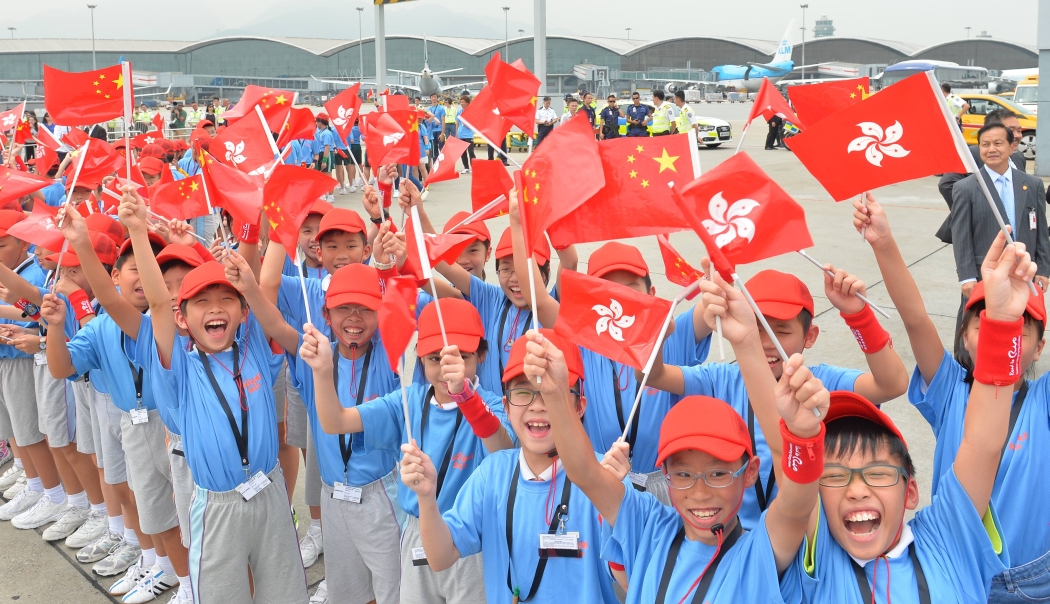
The principal, who has a reputation as an authoritarian, commenced the beginning-of-year assembly with a flag-raising ceremony.
As trained, the older children raised the flag, accompanied by a tinny recording of “March of the Volunteers”.
Next to me, my wife trembled with anger. “We’re under occupation,” she muttered.
Yes, I agreed, it felt like that. It is in these small ways that Hong Kong people feel increasingly marginalized within their own city.
If it had been another occasion, I would have started singing “Raise Our Umbrellas”, the theme song of the Umbrella Movement and hopefully the future national anthem of Hong Kong. I would have drowned out that tinny recording of “March of the Volunteers”. But it was my daughter’s first day. I didn’t want to ruin it for her.
Then I looked around: In that gathering of hundreds of students, teachers, parents and staff, only one single person was singing, a woman who worked in the school office. Some of the older students who had learned but half-forgotten the anthem’s lyrics in past years were dutifully mumbling along, their embarrassed heads bowed. All of the teachers and parents were silent.
Some probably did not like to sing. Some probably did not know the words. (I estimate that only about 25 percent of Hong Kong people can sing the nine-line anthem. There isn’t a Cantonese version, so people are forced to sing an anthem which they are told is their national anthem in a language that is not their own. Some probably, like us, resented the whole proposition that our children’s school year should begin like this, in obeisance to a colonial ruler.
Based on that random sample and multiple other occasions where I noticed people were less than enthusiastic about the anthem, perhaps the Party has not burrowed into our flesh, is far from winning the proverbial hearts and minds. Twenty years on from the handover, however weak, cowardly, craven, stupid, unthinking and “pragmatic” a good many Hong Kong people may be, it will take a lot more to make them swallow this Kool-Aid.
Only the unloved could outlaw being unloved
The people who boo the Party anthem at football matches are the Hong Kong national team’s most ardent fans. Without them, the team would have few loyal fans at all. The atmosphere at the matches is wonderful because of them. In the October match against Malaysia, there were only 6,000 spectators in 35,000-seat Hong Kong Stadium, but they got the place rocking.
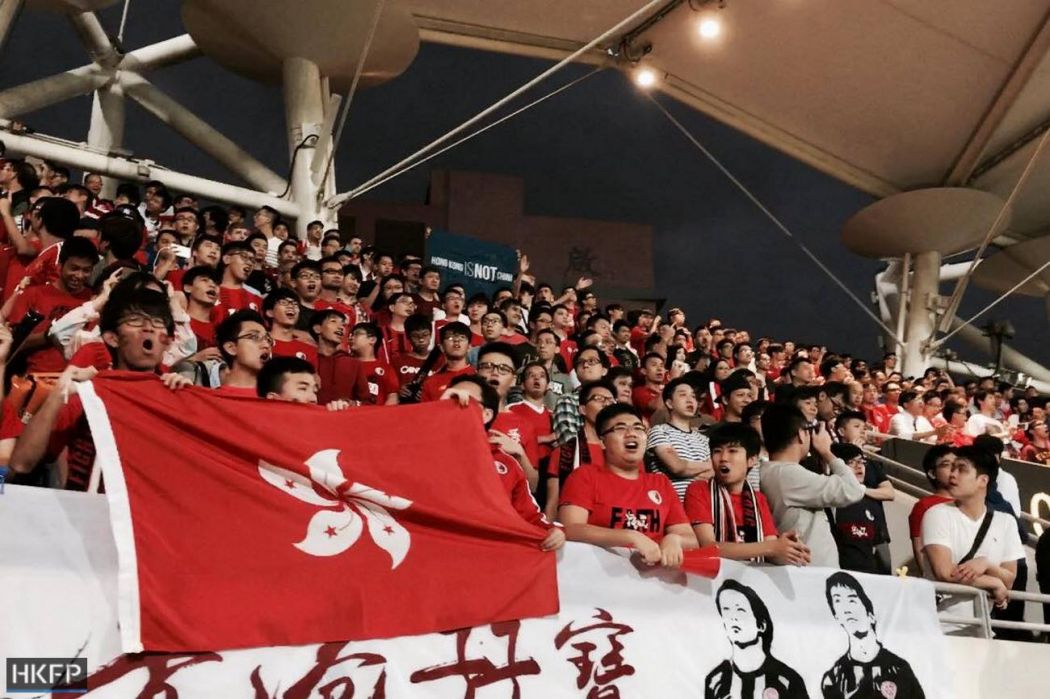
Believe it or not, the booing of the anthem is good-natured. It’s not as if the fans come only to boo. For them, it’s just part of the routine: You come, you cheer the team, you boo the anthem, you cheer the team again. And they’re silently respectful of the opposing team’s anthem.
What does it say about the regime that it can’t even tolerate a little booing? All dictatorships have one thing in common: no sense of humor.
Nor do they have much sense of irony: “March of the Volunteers” evokes righteous, brave young men fervently marching off to join the defence of the motherland, but “respect” of the song will no longer be voluntary. The anthem’s most uplifting phrase is “起來!起來!起來!”—rise up! rise up! rise up!, but then when you do, the Party slaps you down. How reactionary the revolutionaries have become!
China got by just fine without an anthem law until now. I have never heard any report of a mainlander “disrespecting” the anthem. For the first time ever, the Party has promulgated an unnecessary law on the mainland specifically to get it enacted in Hong Kong.
Hong Kong football has no hooliganism, no problem with violence of any kind at matches. You couldn’t ask for better fans. And yet they must be criminalized to save Party face.
The anthem law is of a piece with the modus operandi of the Party: compulsion. It seeks to coerce loyalty to the Party, which it calls “patriotism”. It seeks to erase from the public arena any trace of dissent. If you do not love me, I will force you to. The booing is of a piece with the soul: it wants to be free. It knows that love cannot be coerced.
China is one of the few countries in the world to criminalize disrespect for the anthem and has the most severe punishment.
China’s criminalisation of behavior related to the anthem puts it among a small minority of countries. Many countries have national anthem laws, which often include codes of conduct, but few criminalize anthem-related behaviour. In many countries there is an expectation that respect be shown toward the anthem, but this is a matter of custom, not law.
Apart from China, at least seven countries criminalize behaviour related to the national anthem (maximum punishment in parentheses): Botswana (US$75 fine), Germany (up to 3 years in prison), India (up to 3 years in prison or a fine or both), Malaysia ($24 fine or up to 1 month in prison), Singapore ($734 fine), Turkey (6 months to 2 years in prison), Uzbekistan (25 minimum monthly wages or up to 3 years in prison), and Egypt (up to 1 year in prison and a $1,699 fine). Of these seven countries, only two, Botswana and Germany, are rated “free” (as opposed to “partly free” and “unfree”) in the Freedom in the World Report 2017. Only Germany and India have punishments as severe as China’s. These types of laws are often referred to as “insult” laws and are potentially unreasonable infringements of the right to freedom of expression.

All except one of the above-mentioned anthem laws prohibiting insult to the anthem are decades old. The exception, Egypt’s, was enacted in 2014 by the military rulers after they overthrew the elected government in 2013. Some of the most severe dictatorships in the Middle East lack such laws, though recent incidents involving Islamists refusing to stand for the anthem have upset them.
In addition to China, there have been recent attempts to introduce anthem laws in the Philippines and Russia. In November 2016, the Supreme Court of India issued a controversial order that the national anthem must be played in all movie theaters and that those present must stand for it, but the order entails no penalty or punishment for failure to comply and refers to no criminal statutes to enforce the order. What all four countries and Egypt have in common is governments that manipulate nationalistic sentiment to remain in power.
While Japan has no national law criminalizing behaviour related to the national anthem, it does allow local jurisdictions to make their own rules. Tokyo and Osaka have passed regulations requiring education authorities to record the names of teachers who do not stand and sing the national anthem in school. Hundreds of teachers have been disciplined. The national anthem is an expression of loyalty to the emperor and considered by many to evoke Japan’s militaristic past.
Thailand is well-known for playing the national anthem at 8 am and 6 pm daily, with all expected to stand in silence, but it has no law requiring people to do so. There have been two convictions under the country’s lèse-majesté law for not standing while the royal anthem (which is different from the national anthem) was played in movie theatres. One conviction was eventually overturned and the other resulted in a suspended sentence.
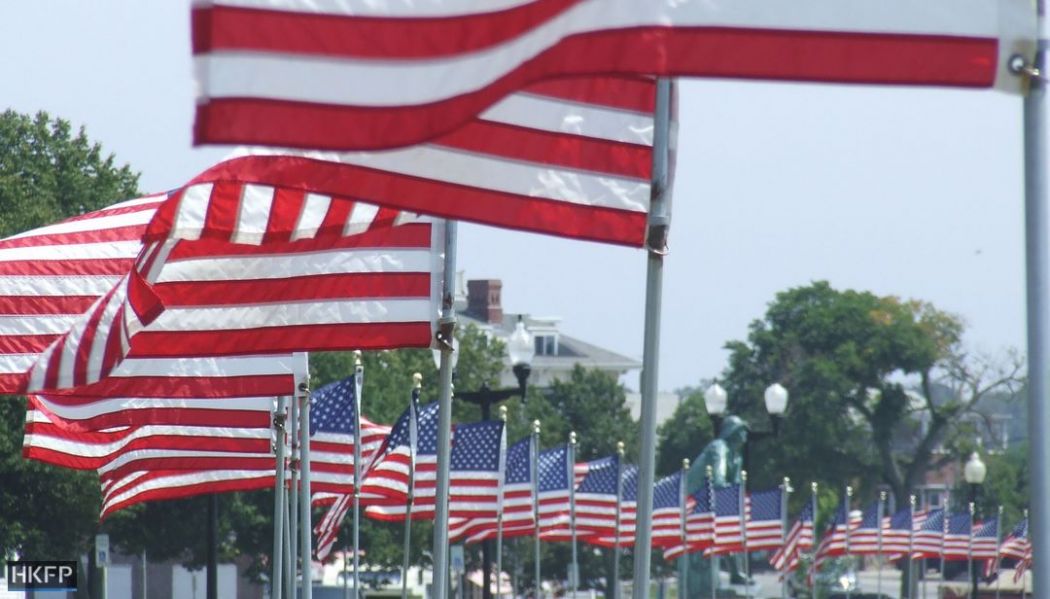
In the United States, standing for and singing the national anthem is customary, but there are no laws requiring this, and previous attempts to enforce such laws have been struck down by the Supreme Court on First Amendment (free speech) grounds.
Hong Kong Executive Councillor Fanny Law has falsely compared China’s new anthem law to the situation in the U.S.: “…Donald Trump has been criticising American football players for kneeling to protest during the playing of the US national anthem.” But while he has criticized them, his government is not prosecuting them, nor can it do so, while the new amendment to Chinese Criminal Law Article 299, based on the Chinese anthem law, expressly criminalizes “disrespect” with a penalty of three years’ imprisonment.
In 1977, the Sex Pistols shocked many in England when they released “God Save the Queen”. The BBC banned the song, but there was and is no UK anthem law and there was never any question of the Pistols being prosecuted. Johnny Rotten said, “You don’t write ‘God Save The Queen’ because you hate the English race, you write a song like that because you love them; and you’re fed up with them being mistreated.”
There is another kind of patriotism
Apart from encouraging people to confuse loyalty to Party and love of nation, another key objective of Communist propaganda and coercion is to make people think that there is no other way, that somehow Party diktat is natural or even reality itself. For that reason, it is a form of resistance to remind ourselves of just how false that is.
I am skeptical of patriotism of all kinds. My loyalty is to humanity. Human beings have human rights, regardless of where they were born or live. But in general, I am more sympathetic to the patriotism of small, threatened countries, whether Palestine or Tibet or Hong Kong. Their nationalism is a reaction to attempts by a greater power to swallow them up, and they use it to defend themselves, as the Irish did against England or the Baltics against the Soviet Union, and many others.
If big countries don’t possess a high degree of self-critical awareness—and few do, Germany being an exception– their patriotism can easily become jingoistic, aggressive, ugly, hateful, and potentially dangerous, especially if rooted in grievance, the “big country as victim complex”.
China, for example, has convinced itself that it was a victim of imperialism (as it was) but the Party will make it great again, while at the same time invading and occupying Tibet in the name of “returning it to the motherland”, invading India and Vietnam, claiming most of the South China Sea as its own, and having outstanding territorial disputes with several of its neighbours.
Its toxic promotion of Party-centric “patriotism” is often directed at some “enemy” target like Japan or the Dalai Lama or “ungrateful and spoiled” Hong Kong people fighting for their rights.
I lived for several years in Norway, which is as close as human beings have come to a perfect society. Norwegians are intensely patriotic. Norwegian patriotism is the only kind I admire. Its key attributes are a belief in fairness, egalitarianism, solidarity (“we’re all in this together”) and respect for and identification with nature, of which there’s plenty. It represents a consensus on basic values arrived at through shared experience and the democratic process.
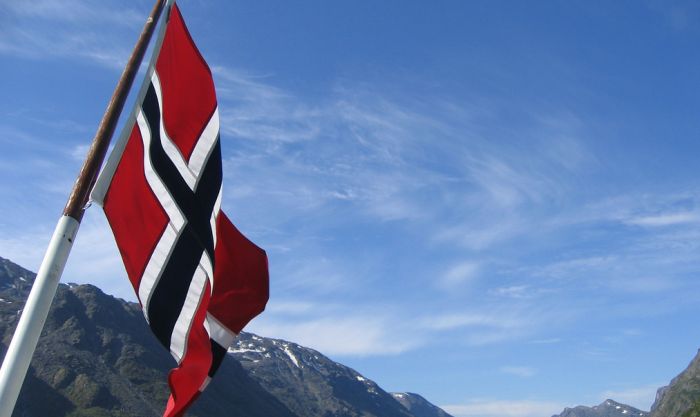
I’m no fan of kings, but I was impressed with a down-to-earth speech defining Norwegians that the Norwegian king gave last year. With compassion and generosity, he stressed diversity and inclusivity. Could one ever imagine a Party leader saying anything like, “Norwegians are girls who love girls, boys who love boys, and girls and boys who love each other. Norwegians believe in God, Allah, everything and nothing”? Could one ever imagine a Chief Executive saying anything inspirational about what it means to be Hong Kong people?
Norway has been fully independent for only a little over 100 years. It endured centuries of colonial domination first under Denmark, then Sweden. When Norwegians got their independence, the first question they asked was, do we want a monarchy or a republic? Norway is the only country I know of that voted by referendum to have a king.
The main event of Norwegian national day, May 17, is not a military parade but a children’s parade to the palace where the royal family waves to them from the balcony. The symbolism is authentic. Most societies have some rhetoric to the effect of children being our future, but Norway complements the words with consistent policies.
Indeed, it could be said the whole society is designed to promote children’s welfare. There is 12 months’ paid parental leave, and everywhere you go, including the bank or a restaurant, you find a play area or family area.
I often compare Norway and Hong Kong. Both are prosperous and have relatively small, homogeneous populations. We too could afford a decent social welfare system, a universal pension system, lengthy parental leave, adequate child and elderly care support for families, solid labour laws and minimal poverty (Hong Kong’s poverty rate is 19.7 percent and rising, versus 7.5 percent in Norway).
The main difference? One place is democratic, the other is not. Political power in Hong Kong is concentrated in the hands of a tiny Party-allied minority who are antagonistic to the very concept of the common good.

Norway has no legally designated national anthem. For over a century, “Yes, we love this country” has been the de facto anthem. Its most frequently sung verses focus on Norway’s nature. After the 2011 massacre which killed 77 people, 69 of them at a youth camp, the most widely sung tribute to the country was “My little country”.
This is shorter, simpler, more down to earth, and composed recently, in 1994. A nice song, though I had to laugh: you can call Norway many things, but it most certainly is not “little”. Of course, the diminutive was a term of endearment, not a reference to size. While other countries have pompous dreams of greatness, it’s striking that this new quasi-national anthem by popular acclaim characterizes the big country as little. The modesty is refreshing.
In response to the massacre, Norway’s biggest single loss of life to violence since World War II, the Norwegian prime minister said, “We will respond with more democracy, more openness, more humanity but never naivety.”
In Hong Kong, a few people boo the Communists’ anthem, and they pass a law banning “disrespect”.
Communist Country versus Umbrella Country
“I didn’t think I was interested in politics before the revolution. I was interested in finding a way to make myself heard when it felt like the whole world wanted to forget me. Now I know that’s what politics is.”
–a mahragranat musician, from The Egyptians: A Radical History of an Unfinished Revolution by Jack Shenker
The Egyptian revolution and the Umbrella Movement have many differences, but in one respect they are similar– the eventual retrenchment of the status quo ante, with a vengeance. Shenker characterizes post-revolution Egypt as consisting of what he calls Mubarak Country and Revolution Country. Mubarak Country has political power and controls the security forces and the economy. Revolution Country is still very much alive and can be found in the many cracks and crevices of society.
These manifestations of Revolution Country among activists, workers, the poor, intellectuals, writers, artists and musicians elude regime attempts to extinguish them. The two have diametrically opposed visions of what Egypt should be. This too sounds like Hong Kong.

What is happening in Hong Kong now is that people are thinking about the sort of society they want, the sort of society that corresponds to how they want Hong Kong to be. That cultural efflorescence is almost diametrically opposed to Party rule, which is why the Party does what it can to wipe it out.
When Hong Kong fans boo the anthem, it’s like Umbrella Country poking into the public sphere, and colliding with Communist Country. The Party’s only way of resolving the difference is by force. It promulgates a mainland law and inserts it into the Basic Law. The rigged Hong Kong government and Legislative Council then pass local legislation to criminalise formerly legal behavior.
I wish to live in a society where rights are continually expanded and better protected, not one where they are continually reduced and eroded. That is why I boo. I boo in the hope that one day Umbrella Country will prevail over Communist Country. The booing will soon make me a criminal. But at least this criminal’s soul will not be harmonized.
Kong Tsung-gan is the author of the recently published Umbrella: A Political Tale from Hong Kong, the first comprehensive account of the 2014 Umbrella Movement.
